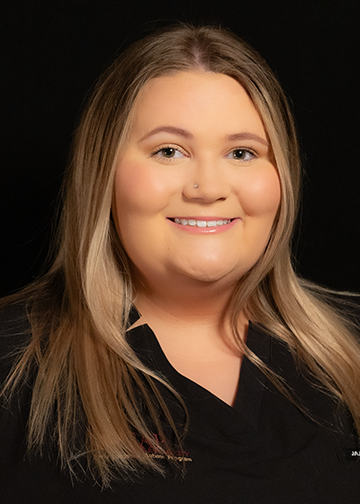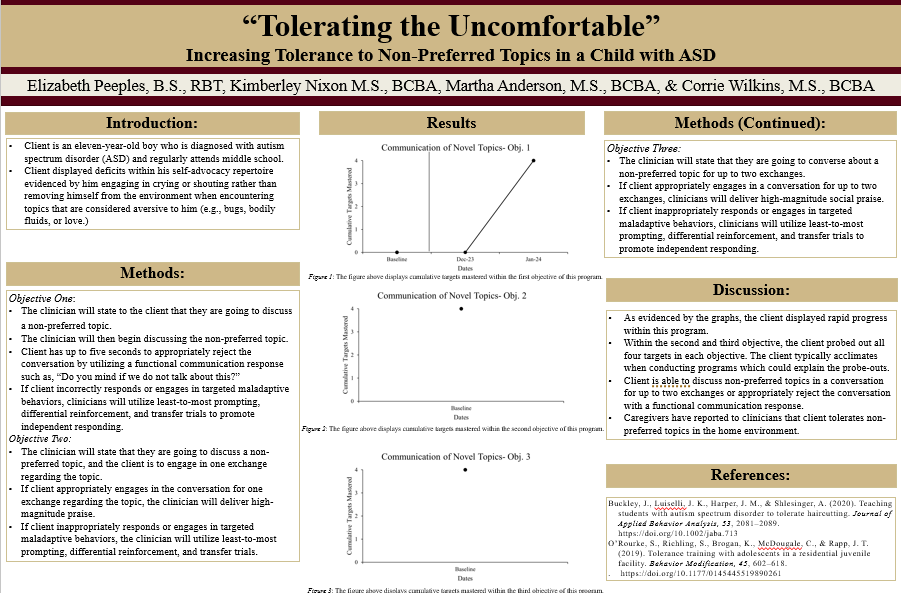Student Research Symposium Program Portal: Submission #66
Submission information
Submission Number: 66
Submission ID: 7861
Submission UUID: e49e85fe-3910-4092-b080-9bb8fe6bd2a6
Submission URI: /student-research/symposium/research-symposium-program-portal
Submission Update: /student-research/symposium/research-symposium-program-portal?token=xAB2ji0pug8u5rnU5izezyUhriOpckPL8QpVbmlIsnA
Created: Thu, 02/06/2025 - 11:07 AM
Completed: Thu, 02/06/2025 - 11:12 AM
Changed: Mon, 04/14/2025 - 01:49 PM
Remote IP address: 146.201.10.30
Submitted by: Anonymous
Language: English
Is draft: No
Webform: Research Symposium Program Portal WF
Submitted to: Student Research Symposium Program Portal
Elizabeth
Peeples
{Empty}

Applied Behavior Analysis, Psychology
I grew up in Panama City, Florida. I enjoy watching movies, especially Wicked. My career goals include graduating with my masters degree and becoming a BCBA. In the future, I hope to become clinical director of a clinic.
Tolerating the Uncomfortable
The client in the procedure is a ten-year-old boy who is diagnosed with autism spectrum disorder. He began services at the Early Childhood Autism Program in April of 2022. Throughout his clinical and home environments, it has been reported that the client displayed a deficit in his ability to tolerate non-preferred topics, such as bugs, blood, throw up etc. When encountering non-preferred topics throughout his environment, the client would engage in maladaptive behaviors including screaming, crying, and elopement. To remediate these deficits, the clinical team opted to implement a Communicating Novel Topics program. The procedure implemented denial and tolerance training to non-preferred topics, before fading in conversations regarding the non-preferred topics. Differential reinforcement and escape extinction from the nonpreferred topic were implemented to aid in the acquisition of the procedure. Research conducted by O’Rourke et al. (2019) demonstrated that the utilization of tolerance training increased the subject’s ability to tolerate a non-preferred stimulus event. Within the individual steps of the program, the client appropriately and independently rejected a conversation involving a non-preferred topic. Once the client was appropriately rejecting a conversation, the client was then required to engage in conversations with up to two exchanges involving the non-preferred conversation. This program was implemented within the month of February 2024 and was mastered in March 2024. Parental reports have shown that the procedure has generalized across environments including his school, the community with friends, and at his home.
Kolton Sellers
Florida State University Panama City
Applied Behavior Analysis, Psychology
sellers@pc.fsu.edu
{Empty}
{Empty}
Tolerance training
C-1 R - 7
Complete
Face to Face Poster session
Research Symposium Poster.pdf244.1 KB

No
2025
5th annual Undergraduate Research Symposium, April 17, 2025
https://pc.fsu.edu/student-research/symposium/research-symposium-program-portal?element_parents=elements/student_photo&ajax_form=1&_wrapper_format=drupal_ajax&token=xAB2ji0pug8u5rnU5izezyUhriOpckPL8QpVbmlIsnA
{Empty}

